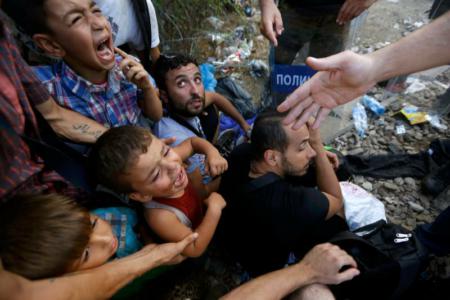Pope begs governments to act to stop anti-Christian persecution
VATICAN CITY (CNS) -- "Do something to put a stop to the violence and oppression," Pope Francis asked the international community after calling attention once again to the fate of persecuted Christians, especially in the Middle East.
After reciting the Angelus Aug. 30, Pope Francis told thousands of people in St. Peter's Square that, the previous evening in Lebanon, martyred Syriac Bishop Flavien-Michel Malke was beatified.
"In the context of a tremendous persecution of Christians, he was an untiring defender of the rights of his people, exhorting all of them to remain firm in their faith," the pope said.
"Today as well, in the Middle East and other parts of the world, Christians are persecuted," the pope said. "May the beatification of this bishop and martyr fill them with consolation, courage and hope."
Departing from his prepared text, Pope Francis told people in the square, "There are more martyrs (today) than there were in the first centuries" of Christianity.
He prayed that the beatification would "also be a stimulus for legislators and those who govern so that religious freedom would be guaranteed everywhere. And I ask the international community to do something to put a stop to the violence and oppression."
The beatification liturgy for Bishop Malke was celebrated in Harissa, Lebanon, Aug. 29, the 100th anniversary of his death. Syriac Catholic Patriarch Ignace Joseph III Younan presided at the liturgy;Cardinal Angelo Amato, prefect of the Congregation for Saints' Causes was present.
As the Ottoman Empire crumbled in the early 1900s, there were waves of violence and persecution against Christian minorities, especially the Armenians and Syrians. Bishop Malke was the Syriac Catholic bishop of Gazireh, which today is the city of Cizre, Turkey. Although advised to flee, the bishop stayed with his people and was arrested.
Cardinal Amato said the bishop was told that if he converted to Islam, his life would be spared, but he refused and was beheaded.
According to the Vatican, the bishop was born in 1858 in Qal'at Mara in what is now southeastern Turkey. Although his family was Orthodox, he became a Syriac Catholic and joined the Fraternity of St. Ephrem. He was ordained to the priesthood in 1883 and named bishop of Gazireh in 1913.
In his homily, Patriarch Younan pointed out that on Aug. 29 the Catholic Church commemorates the beheading of St. John the Baptist. Referring to the 1915 Armenian genocide and what is happening today, especially in Syria and Iraq, the patriarch asked, "Why?"
"The secret of suffering one does not understand. It accepts the spirit of Christ," the patriarch said.
Last summer thousands of Christians in Mosul and the Ninevah Plain in Iraq, including nearly 40,000 Syriac Catholics, were driven out by Islamic State militants. The militants have posted multiple videos of beheadings.
Patriarch Younan denounced the passivity of world powers "that boast defending freedoms and abandon to their fate the people" who took the risk of staying in their homelands.
He stressed that not only Syriac Catholics are under threat, but all the Christians of the East -- Chaldean, Assyrians, Maronites, Melkites, Armenians and that "when the persecution is not physical it is moral."
"Where is the conscience of the world?" he asked.



















